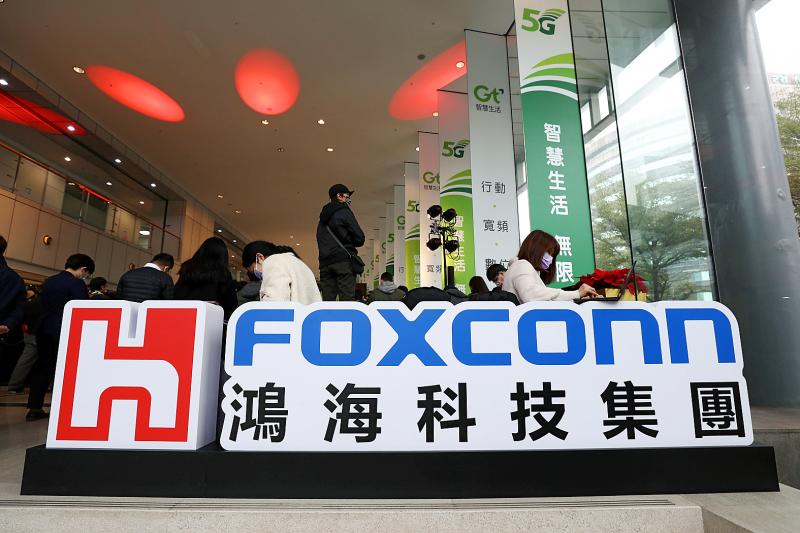Apple Inc’s local manufacturing partner Hon Hai Precision Industry Co (鴻海精密), known as Foxconn Technology Group (富士康科技集團) outside of Taiwan, is setting up a vehicle venture, strengthening its automotive capabilities at a time when technology companies, including its California ally, are looking to expand in automaking.
Hon Hai is joining forces with Chinese automaker Zhejiang Geely Holding Group Co (浙江吉利控股集團) to provide production and consulting services to global automotive enterprises, the companies said in a statement yesterday.
The production and consulting services are related to whole vehicles, parts, intelligent drive systems and automotive ecosystem platforms, Hon Hai said in a filing with the Taiwan Stock Exchange.

Photo: EPA-EFE
Each party is to hold a 50 percent stake in the new joint venture, FuTaiHua Industrial (Shenzhen) Ltd (富泰華工業深圳), with Hon Hai appointing three directors, including the chairperson, to the venture’s five-member board and Geely appointing two, the filing said.
Amid reports of Apple considering making its own electric vehicles (EVs), Hon Hai has been bulking up its automotive muscles swiftly. Such moves might help the company become a major contender to make vehicles for its largest customer.
With development work still at an early stage, Apple would take at least half a decade to launch an autonomous electric vehicle, people with knowledge of the efforts have told Bloomberg News.
That suggests the company is in no hurry to decide on potential auto-industry partners.
Hon Hai in October last year unveiled its first-ever EV chassis and a software platform aimed at helping automakers bring models to the market faster.
It plans to deliver its first development kit in April, with Hon Hai chairman Young Liu (劉揚偉) saying that EV-related business in the first half of this year would be “very good.”
Hon Hai’s key unit, Foxconn Technology Co (鴻準精密), is reportedly expanding a plant to develop automotive metal parts.
Earlier this month, Hon Hai signed a manufacturing deal with embattled Chinese electric-vehicle start-up Byton Ltd (拜騰) with the aim to start mass production of the Byton M-Byte by the first quarter of next year.
Setting up an auto plant can cost billions of US dollars and take years, which is probably why Apple is talking to potential manufacturing partners.
The company has continued to investigate building its self-driving vehicle system for a third-party auto partner rather than its own vehicle, the people familiar with matter have said, and the company could ultimately abandon its own vehicle efforts in favor of this approach.
Other technology companies seeking to expand into the autonomous driving space have also sought partnerships.
Alphabet Inc’s self-driving unit Waymo has worked with Fiat Chrysler Automobiles NV, while Amazon.com Inc has tapped Rivian Automotive Inc for cooperation over delivery vans.
This week, Geely struck a pact with search-engine giant Baidu Inc (百度) to set up a venture to make intelligent EVs.
Additional reporting by staff writer

‘SWASTICAR’: Tesla CEO Elon Musk’s close association with Donald Trump has prompted opponents to brand him a ‘Nazi’ and resulted in a dramatic drop in sales Demonstrators descended on Tesla Inc dealerships across the US, and in Europe and Canada on Saturday to protest company chief Elon Musk, who has amassed extraordinary power as a top adviser to US President Donald Trump. Waving signs with messages such as “Musk is stealing our money” and “Reclaim our country,” the protests largely took place peacefully following fiery episodes of vandalism on Tesla vehicles, dealerships and other facilities in recent weeks that US officials have denounced as terrorism. Hundreds rallied on Saturday outside the Tesla dealership in Manhattan. Some blasted Musk, the world’s richest man, while others demanded the shuttering of his

TIGHT-LIPPED: UMC said it had no merger plans at the moment, after Nikkei Asia reported that the firm and GlobalFoundries were considering restarting merger talks United Microelectronics Corp (UMC, 聯電), the world’s No. 4 contract chipmaker, yesterday launched a new US$5 billion 12-inch chip factory in Singapore as part of its latest effort to diversify its manufacturing footprint amid growing geopolitical risks. The new factory, adjacent to UMC’s existing Singapore fab in the Pasir Res Wafer Fab Park, is scheduled to enter volume production next year, utilizing mature 22-nanometer and 28-nanometer process technologies, UMC said in a statement. The company plans to invest US$5 billion during the first phase of the new fab, which would have an installed capacity of 30,000 12-inch wafers per month, it said. The

MULTIFACETED: A task force has analyzed possible scenarios and created responses to assist domestic industries in dealing with US tariffs, the economics minister said The Executive Yuan is tomorrow to announce countermeasures to US President Donald Trump’s planned reciprocal tariffs, although the details of the plan would not be made public until Monday next week, Minister of Economic Affairs J.W. Kuo (郭智輝) said yesterday. The Cabinet established an economic and trade task force in November last year to deal with US trade and tariff related issues, Kuo told reporters outside the legislature in Taipei. The task force has been analyzing and evaluating all kinds of scenarios to identify suitable responses and determine how best to assist domestic industries in managing the effects of Trump’s tariffs, he

Taiwan’s official purchasing managers’ index (PMI) last month rose 0.2 percentage points to 54.2, in a second consecutive month of expansion, thanks to front-loading demand intended to avoid potential US tariff hikes, the Chung-Hua Institution for Economic Research (CIER, 中華經濟研究院) said yesterday. While short-term demand appeared robust, uncertainties rose due to US President Donald Trump’s unpredictable trade policy, CIER president Lien Hsien-ming (連賢明) told a news conference in Taipei. Taiwan’s economy this year would be characterized by high-level fluctuations and the volatility would be wilder than most expect, Lien said Demand for electronics, particularly semiconductors, continues to benefit from US technology giants’ effort